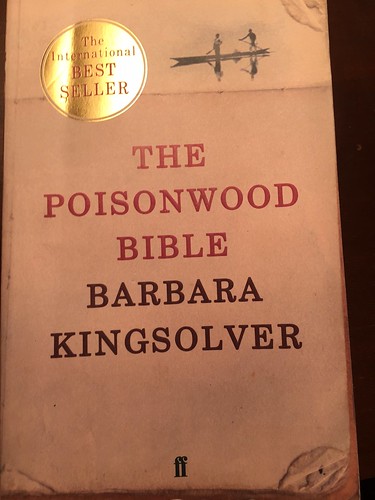
What a book! Wow! I didn't think I would be interested in it (I had put it off for nearly a year), but I couldn't be more mistaken.
A wonderful book, a family saga of a missionary venture in darkest Africa gone wrong, told through the voices of the missionary's wife and each of his four daughters.
In 1959, a wild-eyed, fiercely evangelistic Baptist preacher and his family set up housekeeping in a village of the Belgian Congo, bent on converting the people, baptizing them in the Kwilu River. Rev. Price was the kind of missionary who gives Christians a bad name. Neither teaching nor demonstrating the love of Christ, he butchers the native tongue, saying "poisonwood" when he means "precious" for example, and insists on baptizing the children in the crocodile-infested river, in which no one even dares to wade.
Many disasters occur, most of them natural: floods, famine, and invasion of army ants. The village peacefully revolts against the foreign religion of the American, and, due to violent political revolution elsewhere in Belgian Congo as well as in other African nations, the Prices are urged by the missionary society to return to America, and their funding disappears. Nevertheless, Rev. Price stubbornly remains, holding church, but no one comes except his family. If it weren't for a few friends in the village who supported the wife and daughters, the family wouldn't make it.
It takes a devastatingly tragic event to cause the wife and daughters to leave Rev. Price. The rest of the novel follows their lives as they grow to adulthood and go their separate ways. The last chapter is surprisingly touching and bittersweet.
Favorite characters: Adah, Anatole, Mama Mwanza, Brother Fowles
Least favorite: Rev. Price, Rachel as an adult, Mr. Axelroot
Memorable quotes: from Adah, the handicapped daughter, "The arrogance of the able-bodied is staggering. Yes, maybe we'd like to be able to get places quickly, and carry things in both hands. ... We would rather be just like us, and have that be all right." page 559
Leah, speaking of the effects of war on a society, "In our village there are very few boys of an age to climb trees for birds' nests, or girls stomping down the road with a sibling clutched sideways like an oversized rag doll. I notice their absence everywhere. The war cost most of its lives among children under ten. That great quiet void is moving slowly upward through us. A war leaves holes in so much more than the dams and roads that can be rebuilt." page 592